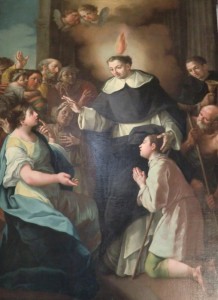* 23 January 1350 Valencia, Spain
† d. April 5, 1419 Vannes, Brittany, France
Name meaning: winning (lat.)
Attributes: fire, star, baptismal font
Patron of designers, builders, roofers, and founders; against headaches, fever, and dangers

Giuseppe Paladini: Vincent Ferrer, 1744, Church of Norcia
Vincent Ferrer was born on 23 January 1350 in Valencia, eastern Spain, into the family of the notary William and Constance. He was the fourth child in a row. However, we know nothing about his childhood. At seventeen, he joined the Dominican order and took his first vows a year later. He was very excited. He studied hard and prayed a lot. Furthermore, he studied in southern France in Valencia, Barcelona, and Toulouse. He was ordained a priest in about 1378. He was a very active and zealous priest. Furthermore, he preached a lot and confessed. Likewise, he reconciled the kings with each other and was their counselor and confessor to Queen Yolanda. In addition, he also developed social activities and took care of the needy. There was a split in the Church at that time (schism). In 1378, Urban VI was elected Pope in Rome. However, some cardinals, primarily French, were unsatisfied with the election, so they elected their own Pope Clement VII, who resided in Avignon. This split lasted about fifty years. This behavior of the cardinals disoriented many. Vincent also joined the side of antipope Clement. After the death of this antipope, the cardinals again elected another, Benedict XIII, who called Vincent to Avignon, made him his chaplain and confessor. At the same time, he was in charge of the papal palace as administrator. But gradually, noticing the circumstances that were happening around him and in the world – a lot of riots in the world ( Turkish invasions, anarchy in Spain and Italy), the performance of reformers (Wicklef, Hus), he began to realize more about the bleak situation the Church is in. He admonished Antipope Benedict to come to his senses. But he disobeyed. Vincent fell seriously ill. Then he envisioned Christ with St. Francis from Assisi, a saint. Dominic. Christ said to him: „Stay firm, leave the papal court immediately, for I have chosen you to preach the gospel in Spain and France.“ When Vincent told Benedict, he did not want to release him, and even appointed him a cardinal. Well, Vincent didn’t give up. Eventually, the Pope released him.
Vincent left Avignon in 1399. He traveled to Spain, France, northern Italy, Switzerland, and Germany. He preached at every opportunity. People listened to him with joy; he had the gift of eloquence. In Spain alone, he converted twenty-five thousand Jews and eight thousand Muslims. Many human hearts have moved and turned their lives for the better. When the people knew he was coming, they went out in crowds opposite him. Pope Martin V himself welcomed him, even the kings. He left a deep and long response in people’s hearts everywhere. At his word, people built monasteries, hospitals, and bridges over steep rivers. God gave him the gift of predicting events, the gift of tongues – spoke his native dialect, and yet everyone understood him. He was among the greatest preachers of the Middle Ages. He got a lot of opportunities from God to become proud of his abilities. Well, it didn’t happen. He was always modest, humiliated, and obedient. He never ate meat, whipped himself in blood every night, and never took money despite frequent offers. If he took, it was only to give them to the poor.
In 1409, cardinals gathered in the Italian city of Pisa to eliminate the bipapacy. They elected a new pope – John XXIII. However, the two old popes did not give up their offices, so instead of two popes, there were already three. Vincent made every effort to abolish this situation. However, it was not until the Council of Constance in 1417 that Pope Martin V was elected, and the other three gave up their offices. Although Vincent did not personally attend the council, he fully supported its conclusions.
Vincent spent the last two years of his performance in Brittany, where he also preached tirelessly. Towards the end, however, he began to feel exhausted. On the advice of his fellow brothers, he set out on a journey to his homeland. But he only reached the city of Vannes. The inhabitants greeted him with joy, but were saddened to hear from his mouth that he had not come to their city to preach, but to die. Severe chills set in, and Vincent died on 5 April 1419. He was declared a saint in 1458.

